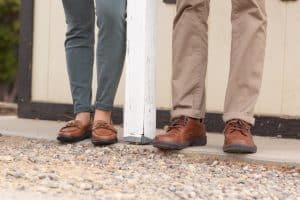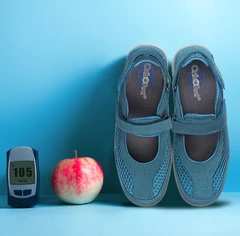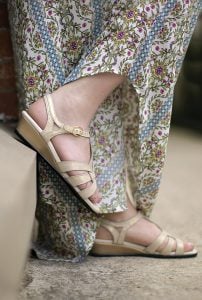
Image credit: Dr. Comfort
Excellent fitting shoes can make all the difference to more than just your outfit choice. In fact, older adults can benefit immensely from taking the time to find the best type of shoes for their own personal challenges or needs. Finding the best shoes for seniors can be overwhelming, especially when most options are not always available at local shops. We consider ourselves experts in researching options for seniors such as Bay Alarm Medical reviews and we’ve done some of the research work to get you started on your quest to find shoes that look great, feel great, and keep you as safe as possible.
Benefits of Finding the Perfect Fit
Ill-fitting or incorrect shoes can be the culprit of any number of conditions or complaints from older adults. Taking the time to consult with a podiatrist and choosing a well-made shoe can make all the difference. A good shoe can provide:
- Decreased foot pain
- Decreased blisters, ulcers, and other wounds on the foot
- Decreased fall risk inside and outside the home
- Improved posture
- Better gait and stride
- Decreased joint pain, including ankle, knee, and hip discomfort
Besides the health benefits of a good shoe for seniors, having a well-fitting and comfortable shoe can increase activity. After all, no one wants to walk around the neighborhood or hit a new trail if their shoes are uncomfortable or painful. Better fitting shoes mean more activity, which can increase strength, endurance, and even offer more opportunities for socialization.
What are the Best Shoes for Seniors with Diabetes?

Specially designed shoes should be a part of your diabetic care plan to increase blood circulation and decrease neuropathy pain. Photo credit: OrthoFeet
The American Diabetes Association reports that approximately 14 million seniors, more than 26%, live with diabetes. While you might not think that people living with diabetes need specialized shoes, diabetic neuropathy can cause pain in the feet and legs, making comfortable and protective shoes a necessity. The correct shoe can also decrease the chance of wounds by increasing circulation in the feet.
Specially designed shoes for people living with diabetes may also be eligible for Medicare or insurance benefits. The Therapeutic Shoe Bill was passed by Congress in the 1990s, allowing reimbursement for special shoes for people who meet certain qualifications. For example, seniors who have a history of foot ulcers or pre-ulcer callouses, or who have diabetic neuropathy with callus formation, may be eligible for Medicare reimbursement.
If you or your loved one has diabetes, consider trying out specialized shoes from Dr. Comfort. This company offers a wide variety of options for men and women that are comfortable, protective, and stylish.
What are Good Shoes for Seniors with Arthritis or Other Foot Pain?
Poor shoe choices can lead to a variety of foot pain causes ranging from joint stiffness to plantar fasciitis. In most cases, increased pain during activity can lead to a more sedentary lifestyle for older adults. Fortunately, the correct shoe can make all the difference.
Shoes can offer relief for those living with arthritis or foot pain caused by bunions or other painful conditions. These specialized shoes offer a wider toe box to allow for more space and less discomfort, as well as ergonomic design features that can make a normal gait feel natural despite joint stiffness.
If you have arthritis, lower back pain, or generalized foot pain, consider looking at shoes from OrthoFeet. Their selection is trendy and has options for sandals, sneakers, slippers, and everything in between.
What Shoes Can Help Seniors Who Have a Fall Risk?

Today’s shoes for seniors are therapeutic and stylish.
Photo credit: SAS Shoes
Falling at home or outside the home is a serious worry for many older adults, and for good reason. The Centers for Disease Control reports that at least 1 in 4 seniors fall in the course of one year, often with serious health consequences. While older adults can fall for a variety of health reasons or medication side effects, they can also fall due to improper footwear that is slick or not sturdy.
You can reduce the chance of falling due to improper footwear by choosing to find a shoe that fits well. If you haven’t had a professional determine your shoe size in a few years, it’s time to get that done by making an appointment with your podiatrist. Shoe sizes can change as we get older, and using an incorrect size can be painful and problematic. Further, if you wear insoles, your shoe size might need to fluctuate to accommodate them.
Next, to prevent falls, look for a shoe that has a non-slide sole. You can also reduce the risk of falling by choosing a shoe that has velcro instead of shoestrings, as these are easier to secure and will not require as much time to adjust as tying your shoes. Get rid of any shoe that has a heel of more than 1 inch as well.
Where to Find the Best Shoes?
The best shoes are not typically available in the local shoe shop. You might need to start with your podiatrist to get a correct fitting and recommendation before turning to different companies to find what works best for you and your situation. You can begin your hunt online, but don’t rule out specialized vendors who stock shoes made just for seniors. For example, companies like SAS Shoes offer online sales via partner sites but also bring selections to wellness fairs and senior living communities across the country, offering a more personal shopping experience.
Remember, good health starts with a solid foundation of the right fitting shoes. Make an appointment with your podiatrist today to get your customized recommendations and personalized sizing before you begin your shopping.


